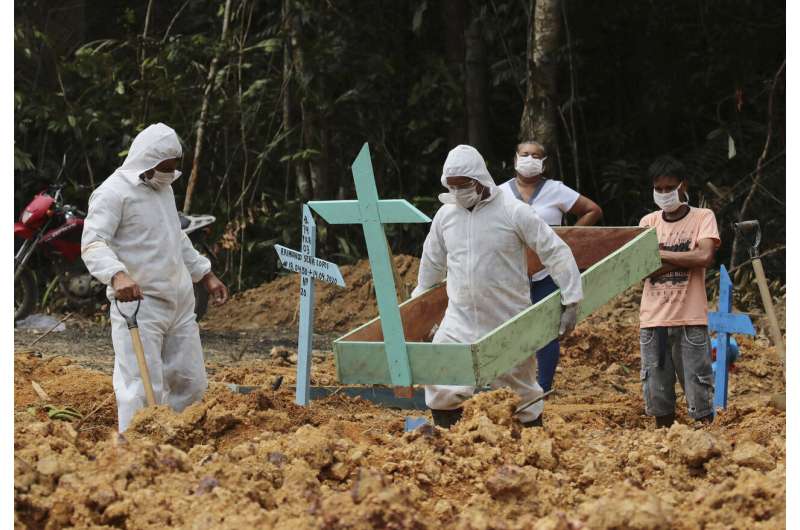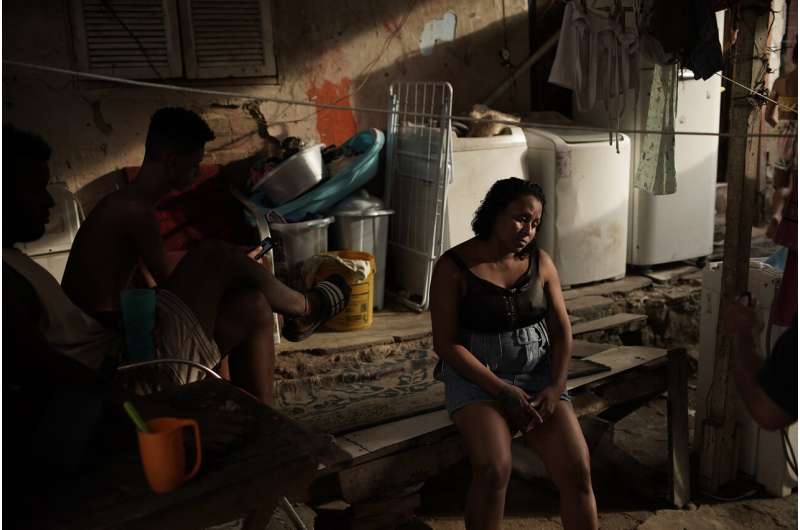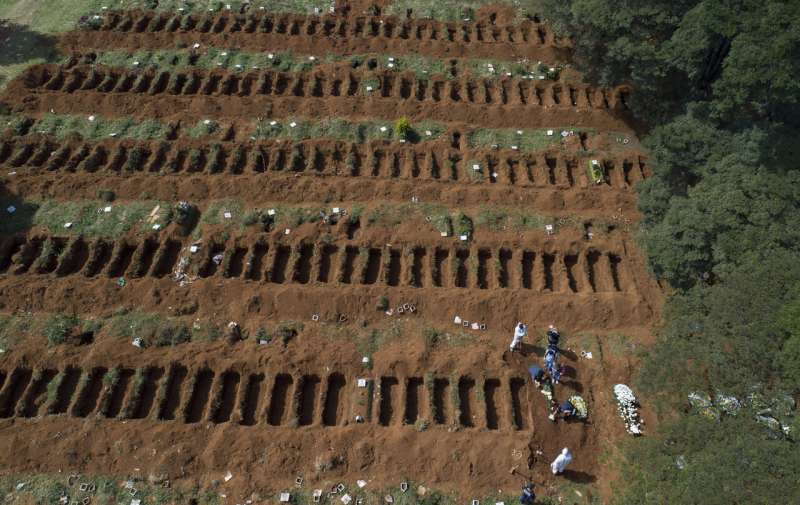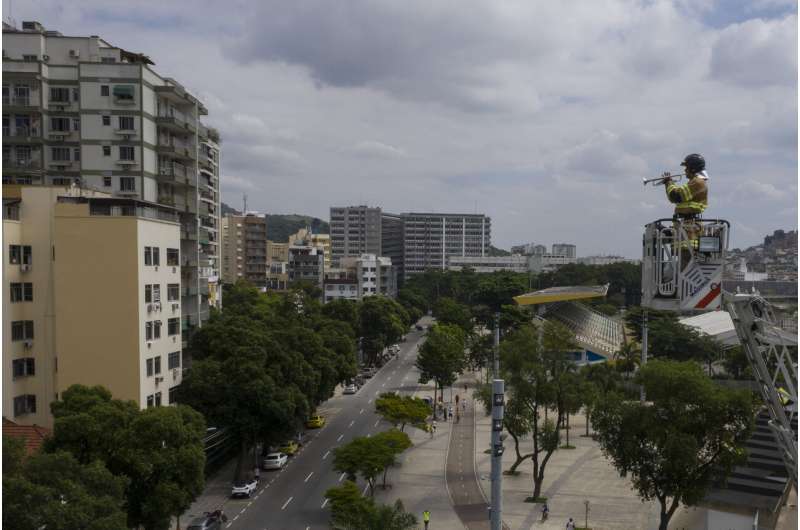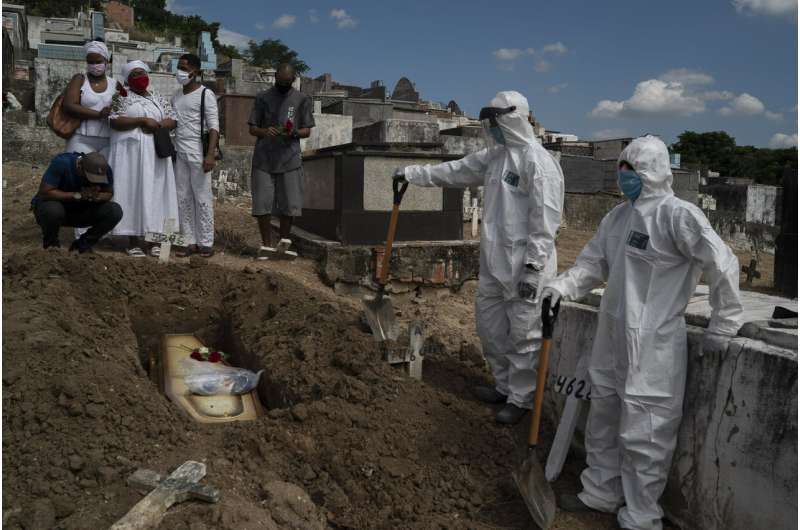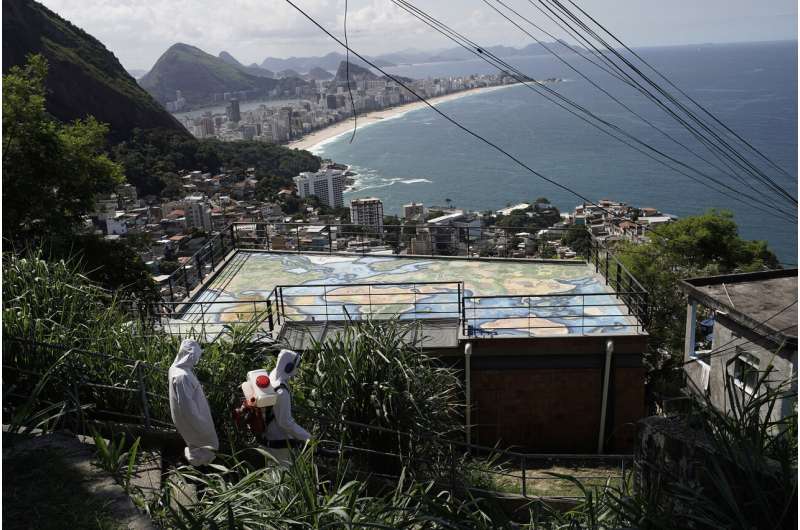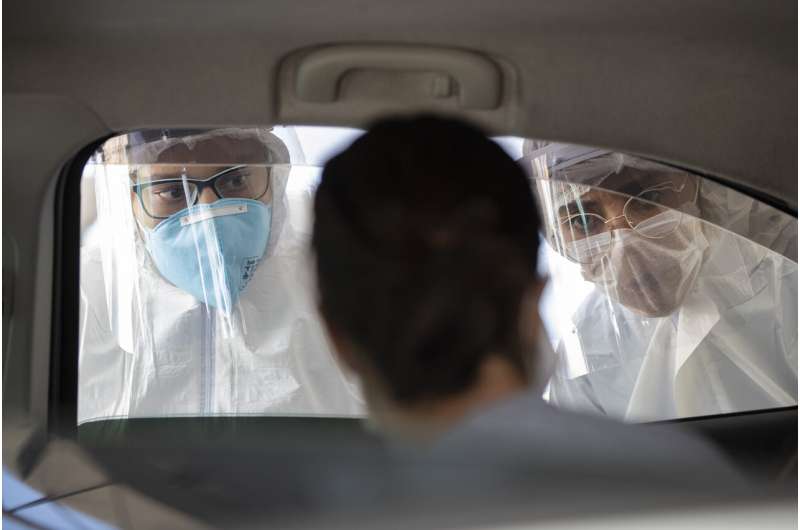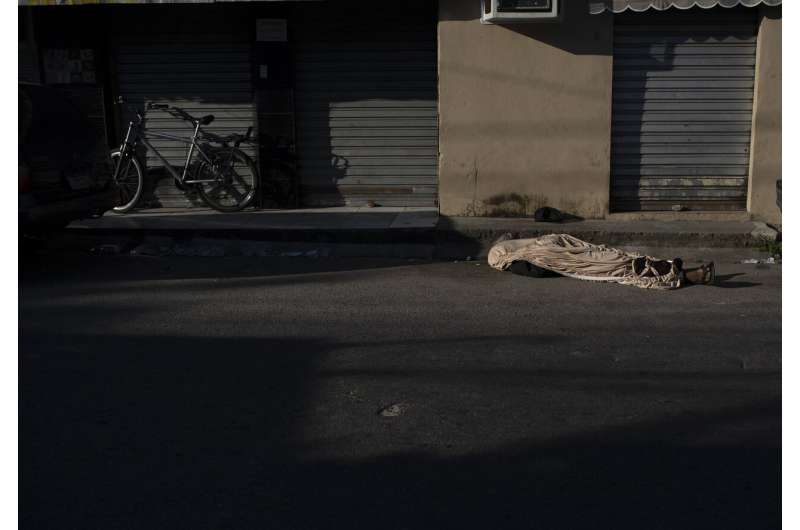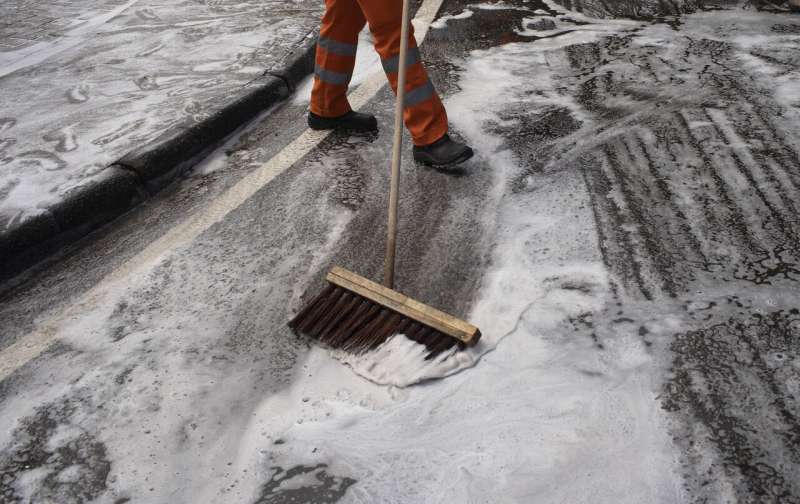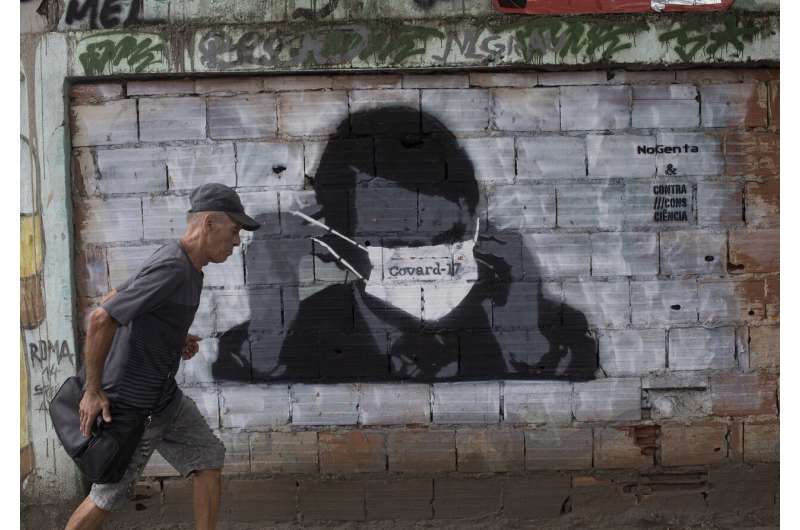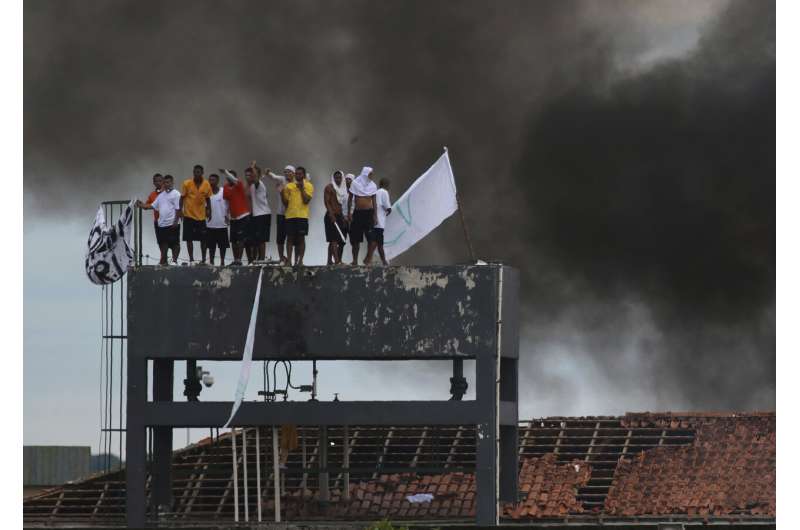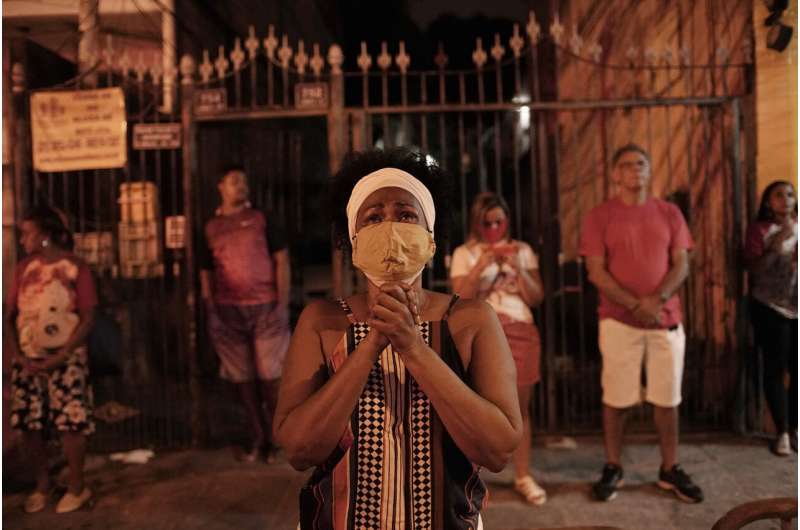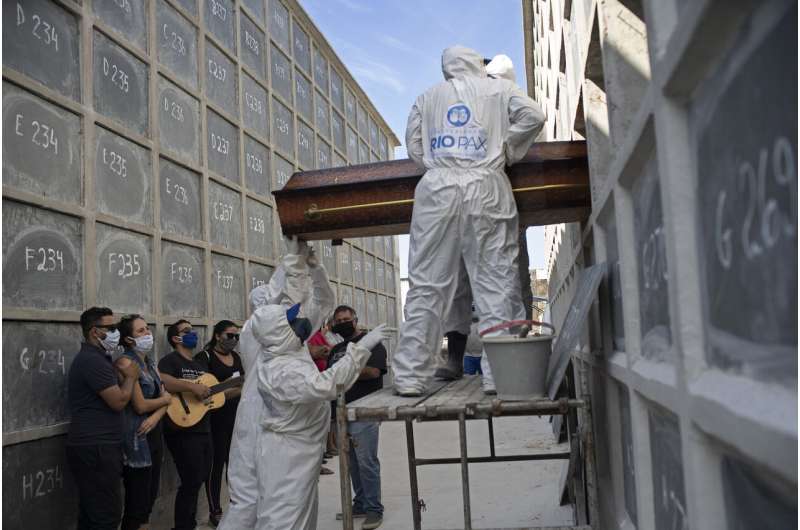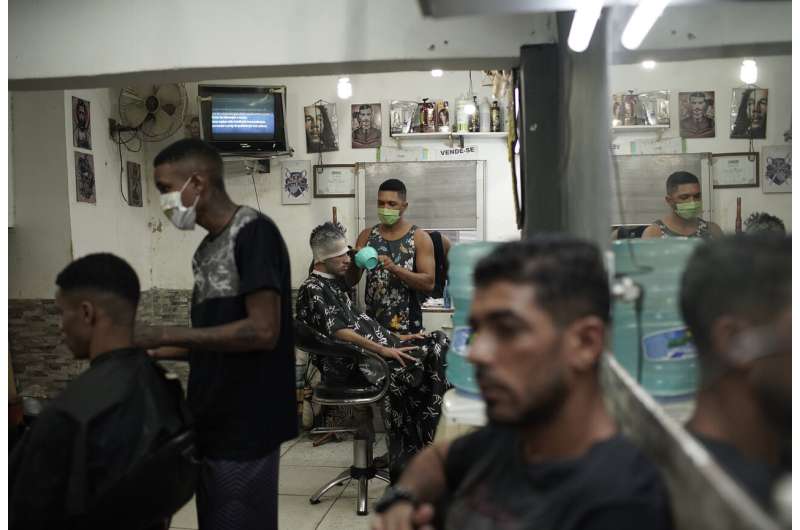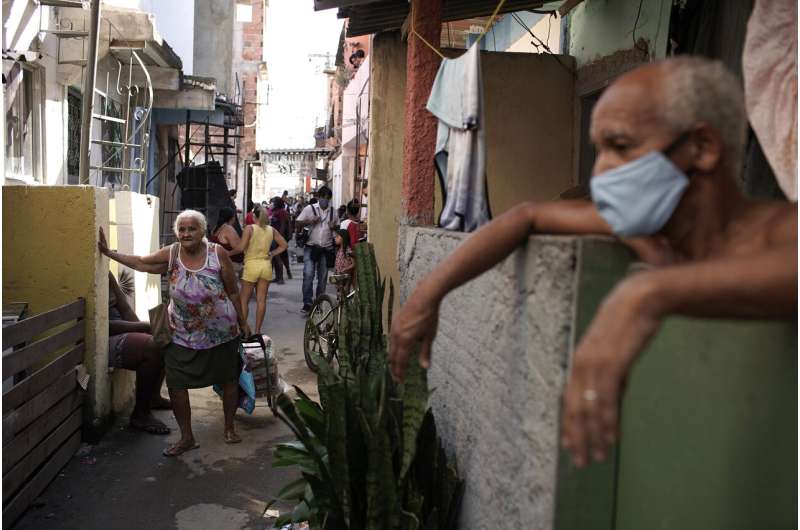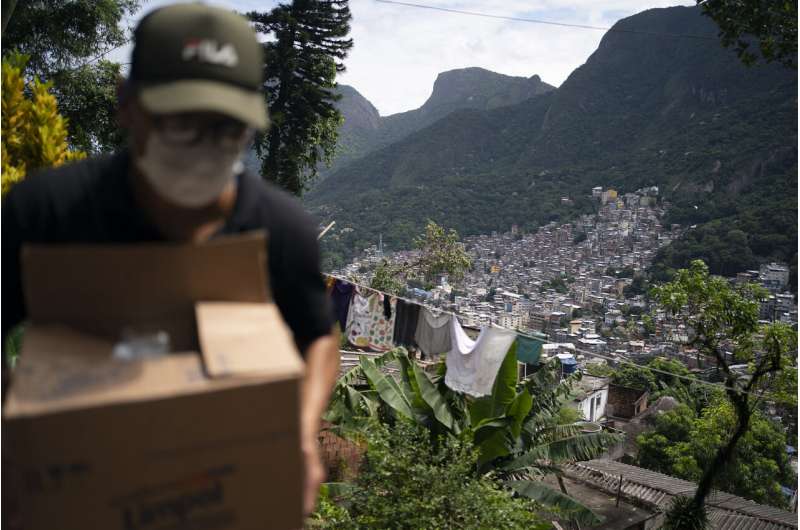In this Thursday, April 16, 2020 photo, funeral workers in protective gear prepare a grave at the Nossa Senhora Aparecida cemetery, for a woman who is suspected to have died of COVID-19, in Manaus, Amazonas state, Brazil. (AP Photo/Edmar Barros)
From the Amazon city of Manaus to the seemingly endless urban sprawl of Sao Paulo and Rio de Janeiro, freshly dug graves have been filling up quickly for weeks with the bodies of Brazilians killed by COVID-19.
Deaths from the coronavirus hit some cities so hard starting last month that officials were unprepared for the crush of bodies even though regional governments imposed measures aimed at halting the spread of the virus.
Meanwhile, President Jair Bolsonaro railed against business shutdowns as more harmful than the virus itself—and the country's first lockdown was not ordered until this week, when there were already more than 7,000 deaths.
As the toll rose, Associated Press photographers and videojournalists fanned out across Latin America's largest and most populous country to capture the agony experienced by regular Brazilians—at cemeteries, at hospitals and at a prison with rioting inmates, as well as at religious ceremonies and inside the homes of grieving relatives.
They spent days traversing the narrow alleys of Brazil's teeming slums, or favelas, where more than 11 million of the country's 211 million people live in cramped conditions that experts fear could be decimated by virus outbreaks.
In one Rio favela, 31-year-old manicurist Leticia Machado and her husband, who does odd jobs, haven't had work since business restrictions were imposed in the city. They're relying on food donations from neighbors and a nearby cultural center to feed their seven children.
In this Wednesday, April 15, 2020 photo, manicurist and mother of seven children Leticia Machado, who is jobless due to the novel coranvirus pandemic, sits listlessly on a bench in her home at the Turano favela, in Rio de Janeiro, Brazil. (AP Photo/Silvia Izquierdo)
The city's hospitals are close to capacity and health workers complain that they don't have enough essential drugs to treat patients. Some workers had to buy their own protective gear at the public hospital where Taina dos Santos' 56-year-old mother worked as a nursing assistant—until she died of the coronavirus late last month.
As gravediggers outfitted in white hooded suits stood holding their shovels at a hillside cemetery, dos Santos said goodbye to her mother's casket.
"She gave everything to her job until the very end," dos Santos said.
In Sao Paulo, an AP photographer captured an image a month ago of hundreds of newly dug grave sites that Bolsonaro called "fake news" and "sensationalism." When the photographer visited again last week, the graves were filled along with dozens of new ones.
In this Wednesday, April 1, 2020 photo, cemetery workers wearing protective clothing as a measure against the spread of the novel coronavirus stand by as family members attend a burial service at the Vila Formosa cemetery, amid the COVID-19 pandemic, in Sao Paulo, Brazil. (AP Photo/Andre Penner)
Bolsonaro, who has repeatedly called COVID-19 "a little flu" and refuses to wear a mask at his public events, has been criticized by protesters who lean from their apartment windows to bang pots and pans. He was pictured on graffiti on a Rio wall wearing a mask with the word "coward" on it, covering his eyes.
Bolsonaro's take on the coronavirus angers Valter Azevedo Bonfim, whose mother died at a Rio hospital after he took her there suffering from what he believed were virus symptoms.
"Look how many hearses are leaving, and that guy is saying that it's a little flu!" he said outside the hospital. "He goes and speaks on TV, telling people to go to the streets. How can we go to the streets? My mother went to the street and I buried her!"
In Manaus, a city of 2.2 million in the vast Amazon region, the death surge was so extreme that trenches for common graves were dug in one cemetery and caskets were piled atop each other. Some who wanted burials for loved ones opted for cremation instead.
-
In this Sunday, April 5, 2020 photo, firefighter Elielson Silva plays his trumpet from the top of a ladder for residents cooped up at home, during a lockdown to help contain the spread of the new coronavirus, in Rio de Janeiro, Brazil. (AP Photo/Leo Correa)
-
In this Tuesday, April 28, 2020 photo, Taina dos Santos, third from left, attends the burial of her mother Ana Maria, a 56-year-old nursing assistant who died from the new coronavirus, in Rio de Janeiro, Brazil. (AP Photo/Leo Correa)
-
In this Friday, April 24, 2020 photo, water utility workers disinfect a flight of outdoor steps in an effort to curb the spread of the new coronavirus, in the Vidigal favela which overlooks the oceanfront Leblon and Ipanema neighborhoods, in Rio de Janeiro, Brazil. (AP Photo/Silvia Izquierdo)
-
In this Monday, March 30, 2020 photo, medical personnel interview commuters, checking to see if they have symptoms of the novel cornavirus, in Guarulhos, on the outskirts of Sao Paulo, Brazil. (AP Photo/Andre Penner)
-
In this Tuesday, April 28, 2020 photo, the body of Luiz Carlos Da Rocha, 36, lies on a street where he dropped dead at the Alemao Complex slum of Rio de Janeiro, Brazil. After more than 12 hours on the street the body of Da Rocha, who the family said suffered from epilepsy, had not been picked up by authorities. Military police said that due the new coronavirus pandemic, they only can remove corpses in cases of violent death. (AP Photo/Silvia Izquierdo)
-
In this Thursday, April 9, 2020 photo, a city worker disinfects an area of the Rocinha favela in an effort to curb the spread of the new coronavirus, in Rio de Janeiro, Brazil. (AP Photo/Silvia Izquierdo)
-
In this Tuesday, April 7, 2020 photo, a man walks past a wall emblazoned with a mural depicting Brazil's President Jair Bolsonaro putting on a protective face mask with the Portuguese word for "coward" written on it, in Rio de Janeiro, Brazil. (AP Photo/Silvia Izquierdo)
-
In this Saturday, May 2, 2020 photo, inmates at the Puraquequara prison stand on a water tower as they protest against bad conditions and restrictions on family visits put in place to curb the spread of the new coronavirus, in Manaus, Brazil. (AP Photo/Edmar Barros)
-
In this Thursday, April 23, 2020 photo, a woman wearing a mask as a precaution against the spread of the new coronavirus, prays illuminated by a street lamp outside the closed Saint George Church, marking the feast day for Saint George who is associated with bravery and resistance, in Rio de Janeiro, Brazil. (AP Photo/Silvia Izquierdo)
-
In this Thursday, April 30, 2020 photo, family members watch as cemetery workers place into a niche a coffin with the remains of Carmen Valeria, 76, who is suspected to have died from the new coronavirus, in Rio de Janeiro, Brazil. (AP Photo/Silvia Izquierdo)
-
In this Tuesday, April 21, 2020 photo, haircutters, wearing protective face masks as a precaution against the spread of the new coronavirus, attend to clients in a barbershop in the Mandela favela of Rio de Janeiro, Brazil. (AP Photo/Silvia Izquierdo)
-
In this Tuesday, April 21, 2020 photo, an elderly woman pulls a grocery caddy filled with food donated by a non-governmental agency amid the the new coronavirus pandemic, in the Mandela favela of Rio de Janeiro, Brazil. (AP Photo/Silvia Izquierdo)
-
In this Tuesday, March 24, 2020 photo, a volunteer carries a package with soap and detergent to be distributed to residents in an effort to curb the spread of the new coronavirus, in the Rocinha favela of Rio de Janeiro, Brazil. (AP Photo/Leo Correa)
In a poor working-class Manaus neighborhood, 86-year-old Raimundo Costa do Nascimento died at his home surrounded by family members and was pictured with eight of them as he lay dead in bed.
They had to wait 10 hours for his body to be retrieved.
© 2020 The Associated Press. All rights reserved. This material may not be published, broadcast, rewritten or redistributed without permission.
